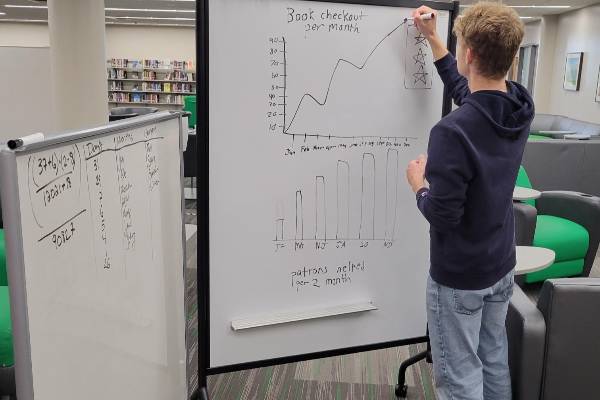Scholarly Communication
Our suite of Scholarly Communication research guides provides in-depth information on Open Access, Open Educational Resources, Researcher IDs, Research impact (metrics and altmetrics), Data Management, Author’s Rights, and Publishing Strategies.
Find out more about Scholarly Communication by contacting Brittany Fischer our Scholarly Communications Librarian.
You can deposit your research (articles, data, dissertations and theses, etc.) in the UND Scholarly Commons.
Find out more about the Commons by contacting Zeineb Yousif our Digital Initiatives Librarian.
Communicate Your Research

Signing away most or all of your rights in publishers’ copyright transfer agreements? Discover related US copyright law, tools to negotiate better contracts, and alternative publishing options to retain your rights.

Learn how to manage research data appropriately so it can be reused to advance academic knowledge and fulfill funding agency requirements. Explore ways to locate, organize, share, and store your data, and use handy templates, checklists, and other data management tools.

Explore how researcher profiles and online communities can make your research more globally visible by sharing ideas, articles, and research data, communicating with peers, and collaborating on research.

Investigate tools for communicating your research and scholarship. Identify predatory publishers, resources for finding quality book and journal publishers, and tools for collocating your research citations.
Research Impact
The metrics and altmetrics research guides provide tools for demonstrating the global impact of your research, which is vital for securing promotion, tenure, or your first job.
The metrics guide discusses journal impact, article impact, book impact, researcher impact, reward for peer review, and related tools. The altmetrics guide reviews the origin of altmetrics (an alternative method for gauging research impact through social media conversations, blog posts, news stories, number of downloads, etc.), and presents various open access and library tools to discover their power for impact.
Scholarly Communication FAQ
The formal or informal cycle of communication regarding the following:
- research, data, collection, and analysis;
- authorship;
- peer-review;
- publication;
- discovery and dissemination; and
- preservation of research and other scholarly outputs. (Association of College & Research Libraries, Principles and Strategies for the Reform of Scholarly Communication 1, 2003).
Visit the Scholarly Communication research guide to find out more.
"Research impact is the demonstrable contribution that research makes to the economy, society, culture, national security, public policy or services, health, the environment, or quality of life, beyond contributions to academia" (Australian Research Council).
Research (impact) metrics are:
- Data potentially reflecting either the attention given to—or the impact or quality of—articles, journals, books, and researchers themselves;
- Quantified and presented in a variety of ways depending upon the tool used, the publisher of that tool, and the method of calculation employed;
- Part of a complex and subjective system;
- Incorporated into various tools, websites, and databases;
- Used to support Publishing strategies, Promotion & Tenure).
Find out more on the Metrics research guide.
Altmetrics complement traditional research metrics in supporting applications for tenure and promotion and grant applications, discovering new research, and highlighting university research impact.
Are citations to your research outputs and endeavors all over the place? Use platforms like Google Scholar, ORCID, and Publish or Perish to find, organize, collocate, and manage them.
How is your name reflected in researcher authority records? How many formats is it in, and in how many databases? Let ORCID help you.
ORCID—a standard "go to" for scholars, peers and the publishing industry to identify you and your research—can:
- Create a unique ID (ORCID) for every researcher;
- Connect your IDs and citations across platforms like Web of Science, Scopus, CrossRef, and more;
- Formulate citation counts and researcher h-indices from this data; and
- Identify you to your peers, letting them know where to find your research.
Are you able to demonstrate that your research is being viewed? You can ensure that it is by depositing your work in the UND Scholarly Commons, UND’s open access institutional repository.
The Scholarly Commons accepts any work of research or archival value conducted by UND faculty, staff, and students. Most publishers will allow you to deposit a version of your journal articles or book chapters on an institutional repository. We can also deposit a collection of works (i.e., a dataset of research videos, or a collection of archival photographs). Contact the Digital Initiatives Librarian, Zeineb Yousif, for more information.
Find out more: Scholarly Commons – Frequently Asked Questions.
Learn more about Open Access and developing Publishing Strategies.
Fear not! You do not have to sign the first contract presented to you. Before signing a contract think carefully about which rights you wish to retain and what the publisher actually needs to publish your book or article for the first time. Knowing what your rights are and what you may wish to do with your work in the future will help you figure out the best way to protect your rights while publishing your work.
Find out more on our Author’s Rights guide.
Data management encompasses activities like deciding how to organize your data (naming conventions, version control, access controls, etc.), how to back up data during a research project, and how to preserve and share your data after project completion.
Find out more on our Data Management guide.
You can also make your data open and available to your peers on UND’s Scholarly Commons.
The Scholarly Commons accepts any work of research or archival value conducted by UND faculty, staff, and students. We can also deposit datasets and collections of works (i.e., a dataset of research videos, or a collection of archival photographs).
Visit Scholarly Commons – Frequently Asked Questions or contact the Digital Initiatives Librarian, Zeineb Yousif, for more information.
There are many factors to consider when determining where, and how, to publish your work. Visit our guides to learn more about Open Access and developing Publishing Strategies, including information on how to find quality publishers and journals in your field.
Check out Publishing Strategies for information on identifying quality and predatory publishers, and for publishing tips. Discover databases and tools for journal, article, book, and researcher metrics with the Research Impact – Metrics guide.
